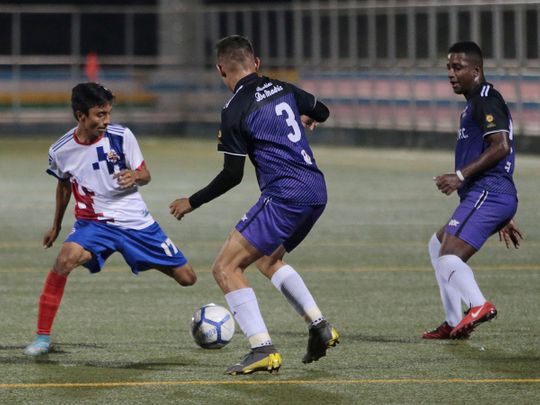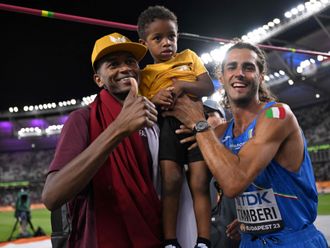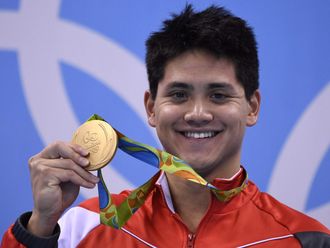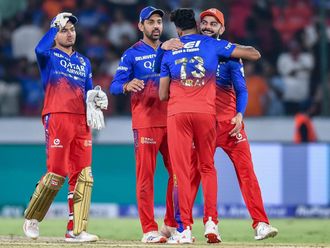
All over the world, sports have shut down. Yet in one country, an alternate universe exists with a very full sports calendar.
Nearly two weeks ago, a national boxing tournament in Nicaragua began as planned. A couple weekends ago, a marathon was run in Managua, the country's capital. Last week, after an important game in the country's popular semiprofessional baseball league, fans participated in a caravan that ended with a rally in the town of Jinotepe's main square. Nary a mask was in sight, nor was social distancing followed.
And the five scheduled matches last week in the country's top professional soccer league were played, albeit in stadiums closed to the public. Despite protests by some players and teams, La Liga Primera is the only professional soccer league still in action in the Western Hemisphere.
The continued mass gatherings in Nicaragua, one of the few countries - along with Belarus and Tajikistan - that are fully carrying on with professional sports, has worried international health officials and sports figures alike.
"It's inconceivable," said Dennis Martinez, a former star pitcher in Major League Baseball and one of the most famous athletes from the Central American country of more than 6 million people. He added: "As a Nicaraguan, I'm very worried about everything there. I see it from a humanitarian perspective. It hurts me to see that we can't react to reality."
Camilo Velasquez, a Nicaraguan soccer journalist who runs FutbolNica, said he felt ashamed that "the world sees Nicaragua as foolish."
"There aren't any sports at a worldwide level, but all eyes are now looking at the four corners of the world where there is sufficient authoritarianism to keep exposing their soccer players," he said.
The continuation of sports is part of Nicaragua's contrarian response to the coronavirus. Although President Daniel Ortega has been absent from public view for a month, his socialist government has told the public to carry on as normal. It has pressed its citizens to visit festivals and the beach. It has kept public schools open.
Nicaragua has not closed its borders and is the only country in Central America that has not declared a state of emergency. As nations around the world locked down, Nicaragua announced it would not enact a quarantine, and Ortega's wife, Vice President Rosario Murillo, called for large public marches across the country under the slogan "Love in the Time of COVID-19."
As of Monday, authorities in Nicaragua, the poorest country in Central America, had reported only one death and just nine confirmed cases of the coronavirus - all imported from abroad. They have also said that their efforts, like follow-up phone calls with recently arrived travelers or campaigns to promote hygiene, have been successful.
(BEGIN OPTIONAL TRIM.)
"We don't have local community transmission, infinite thanks to God," Murillo said during a speech on Thursday.
Still, Nayib Bukele, president of El Salvador, which had 137 confirmed cases as of Monday, has publicly questioned the veracity of Nicaragua's low numbers and suggested that the country's insufficient measures could make the outbreak worse in the region. Nicaragua's neighbors, Costa Rica and Honduras, have nearly 1,000 cases and 30 deaths combined, according to the World Health Organization.
Dr. Carissa F. Etienne, director of the Pan American Health Organization, said last week that her institution was concerned about a litany of problems in Nicaragua - from mass gatherings to the testing itself - and "what we see as inadequate infection prevention and control."
Murillo, the government's lead spokeswoman, did not respond to a request for comment.
(END OPTIONAL TRIM.)
Through sports, the Nicaraguan government can attempt to project an image of normalcy. But life and the economy in the country have been anything but, particularly since April 2018, when protests began against the government. The Ortega administration, which has been accused of taking draconian measures and cheating in elections, has eliminated term limits and harshly cracked down on dissent, resulting in 328 deaths, according to the Inter-American Commission on Human Rights.
Sports are "a bit like giving bread and circuses to the people," Velasquez said.
"The government,'' he added, "fears that the COVID-19 situation creates the perfect argument for the opposition to create a sense of a national stoppage or strike."
With some exceptions, Nicaraguan sports are largely funded and directed by the national and local governments.
Carlos Reyes, commissioner of the national baseball league, said in a telephone interview that the coronavirus outbreak wasn't yet a problem in the sport, that fans were constantly reminded to wash their hands, and that the already hard-hit economy needed to carry on. He noted that the 18-team league was following the lead of the country's health and sports officials.
"We can't decide on our own," he said. "If they tell us to stop, we would."
Orlando Canales, a spokesman for the soccer league, echoed that sentiment and said the league's leaders had not deemed it necessary to suspend the 18-game season. The league, which broadcasts its games on television and online, did vote on March 20 to close the stands. (League officials have noticed an uptick in viewership and betting on their games.)
A 20-team national basketball tournament recently suspended play until after Easter because the parents of youth players - guided by "fear and disinformation," the director of sports for the municipality of Managua, Noel Gonzalez, said in a text message - didn't allow their children to attend games. Gonzalez expressed confidence in public health officials and said that preventive measures had been shared with all teams.
Other parts of society have pushed back. There have been grassroots campaigns to inform the public about the benefits of staying home. Some businesses have shuttered on their own. Traffic has slowed. While attendance at baseball games is down in Managua, fans in more rural areas, at the government's urging, have still filled stadiums.
"They should have stopped the games already," said Edgar Tijerino, a longtime Nicaraguan sports journalist and broadcaster.
(STORY CAN END HERE. OPTIONAL MATERIAL FOLLOWS.)
One baseball player paid dearly for his refusal to play. According to local news reports, Robin Zeledon informed his team, the Brumas de Jinotega, on March 25 that he no longer wanted to play because he was worried about becoming infected with the coronavirus and spreading it to his family. The team suspended him for a year and stopped paying his monthly salary of nearly $200 a month.
Reyes, the league's commissioner, disputed reports about Zeledon's departure, saying the player had left the team for other reasons and been punished for snapping at a coach. Zeledon didn't respond to a Facebook message seeking comment.
Martinez, nicknamed "El Presidente" because he is beloved in his homeland, called Zeledon courageous and reprimanded those overseeing sports in Nicaragua, in an interview with the country's largest newspaper, La Prensa. Calling from his home in Miami, Martinez added more last week, "One of the problems that exists there is the lack of independence of the institutions."
More players have not publicly protested out of fear of repercussions, he said.
One group of players made its protest very public. After learning that a case of the coronavirus was found near their home stadium, players on DiriangEn, the oldest and most successful soccer club in Nicaragua, decided not to play their March 21 match. The management of DiriangEn, the only team to push for a suspension of the season in the league's weekly meetings, supported the players.
Velasquez said that while every team in the league receives some government funding, DiriangEn is the rare team whose management isn't linked directly to authorities.
After learning about the potential penalties for skipping the game, DiriangEn players agreed to play under one condition: that they wear gloves and masks. In a jarring photo posted to the team's social media accounts, players posed with their faces and hands covered. The caption read, "Leaders more than ever!"
Soon after that game, 19-year-old forward Sebastian Barquero, a Costa Rican, said he had told DiriangEn officials that he wanted to return home, which the team allowed. A few other foreign players have done the same.
Speaking via WhatsApp from his home in Heredia, Costa Rica, where he was finishing the second week of his government-mandated 14-day quarantine, Barquero said he was alarmed by the lax behavior concerning the coronavirus that he saw in Nicaragua.
"I don't know why they haven't stopped playing yet," he said. "Across the entire world, soccer has stopped - but not in Nicaragua."








